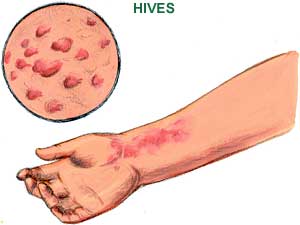What Are Hives And Natural Treatments
 Today my friends I thought we would discuss a rather irritating subject-Hives! Let’s learn what they are, what causes them, and what we can do to stop them. So listen up if you suffer from hives and stop that scratching!
Today my friends I thought we would discuss a rather irritating subject-Hives! Let’s learn what they are, what causes them, and what we can do to stop them. So listen up if you suffer from hives and stop that scratching!
What are hives? They are raised, red itchy, areas that vary in size and shape. They can appear anywhere on the body, but most commonly on the arms, legs, and trunk. They are also referred to as urticaria, wheals or welts. They can last for a few minutes or for several days and can be recurring especially if you can’t identify the cause. In cases where the hives last less than 6 weeks they are considered acute but more than 6 weeks is designated as chronic. The cause of chronic urticaria is often hard to pinpoint, it is thought to be related to a person’s own immune system triggering the reaction.
An estimate 15 -20 % of the population will sometime in there lifetime experience hives and the most common age group is young adults mainly post adolescence through the 3rd decade of their lives, although you can get hives at any age.
What causes hives? They appear from an allergic reaction to from many different irritants and sometimes the cause is not identified. Factors include foods, medications, insect bites or stings, infections, or even emotional stress. Other known causes can be heat, exposure to cold, and infections such bacteria candida albicans (yeast), viruses such as Hepatitis B. A chemical in the body called Histamine is released in response to an irritant that causes the hives.
Drugs are the leading cause of hives in adults, but in children it is usually food, foods additives, or infections. The most common hive induced drugs is penicillin and aspirin.
The most common foods that induced hives is milk, fish, meat, eggs, beans, and nuts. In children food colorant or dyes are a major factor in many cases of chronic urticaria and in more sensitive individuals, flavorings (saclicylates, aspartame), preservatives (benzoates, nitrites, sorbic acid), antioxidants (hydroxytoluene, sulfite, gallate), and emulsifiers/stabilizers (polysorbates, vegetable gums) have all shown to be factors in hives.
Psychological aspects: in one retrospective study involving 236 cases of chronic hives factors such as stress were reported to be the most frequent primary cause. Stress appears to play an important role by decreasing intestinal secretory IgA levels.
Thyroid hormone replacement therapy has dramatically improved chronic urticaria in patients who had normal thyroid function but had evidence of thyroid autoimmunity.
Some Useful Natural Remedies and Treatments:
1. Soak in a lukewarm bath or use cool compresses that acts as antihistamine to reduce the allergic response. Avoid heat or rubbing this will release more histamines and therefore cause more hives.
2. Another treatment that has been of some benefit especially patients with reactions to cold is using ultraviolet light A & B therapy.
3. Relaxation therapy and hypnosis was shown to provide significant benefit to stress induced urticaria.
4. Supplement of Vitamin B12 has been reported to be of value in treatment of acute and chronic urticaria. Make sure the supplement you are using does not have additives or preservatives added.
5. Quercetin has significant evidence of reducing pathogenesis of urticaria, especially in ingested food allergies.
6. Vitamin C has demonstrated as a useful tool to controlling urticaria.
7. Elimination Diet is of the utmost importance in treatment of chronic urticaria and should eliminate suspected allergens and food additives.
If you suffer from acute or especially chronic urticaria I hope some of these suggestions will be helpful to finding the cause and the proper treatment. I have personally experienced chronic hives and understand the challenge to finding the cause, the distress and extreme discomfort that is involved. As always, I would recommend speaking to your health care provider before trying any of these treatments and hopefully they will be able to guide you in the best direction to eliminating urticaria.
Quote of the Day: Twenty years from now you will be more disappointed by the things you didn’t do than by the ones you did do. So throw off the bowlines. Sail away from the safe harbor. Catch the trade winds in your sails. Explore. Dream! – Mark Twain

Pingback: Edible Nightshades: Facts you Need to Know for Your Health